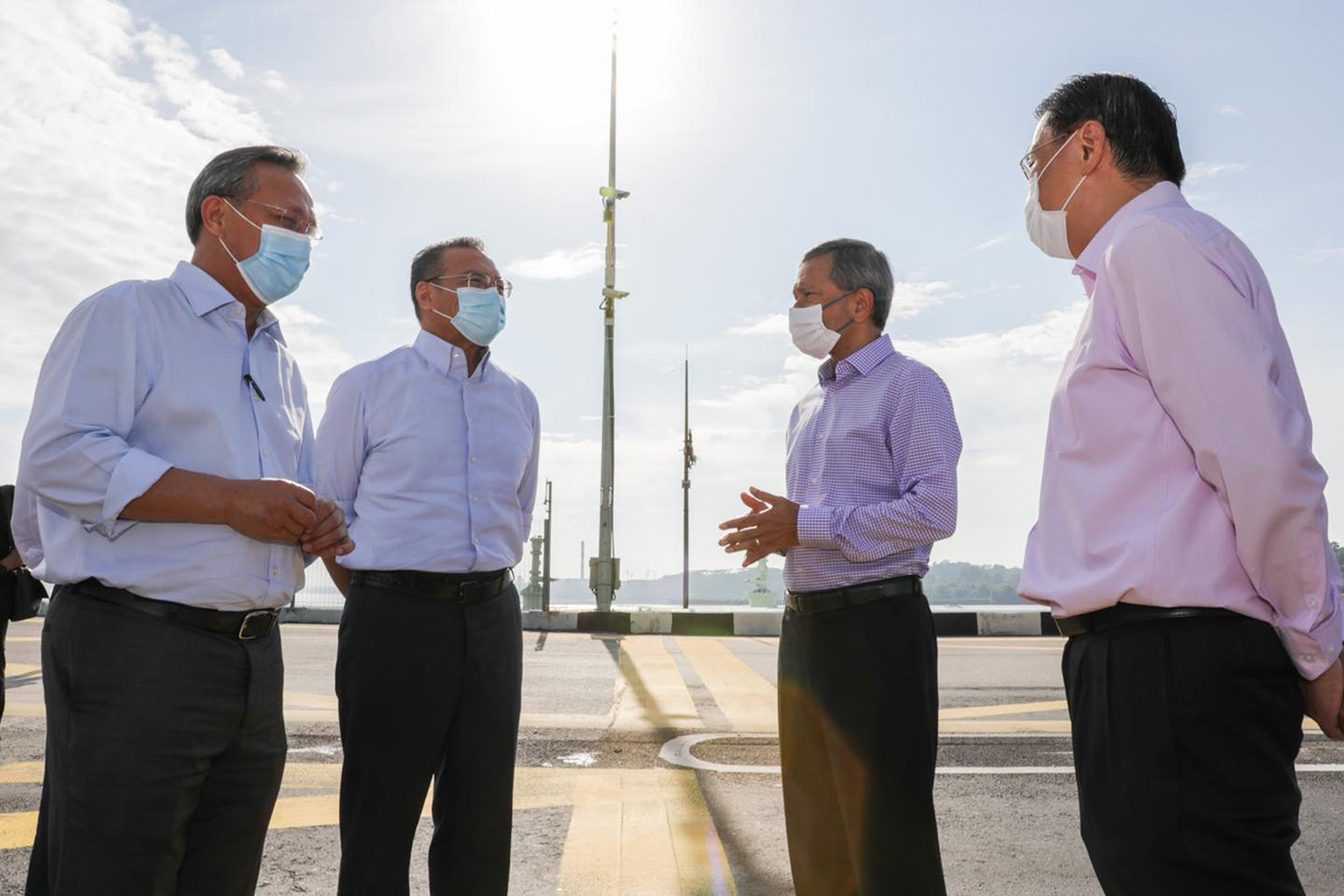Singapore and Malaysia finalise two cross-border travel schemes
They are for long-term pass holders and travellers on essential or official business
Sign up now: Get ST's newsletters delivered to your inbox

(From left) Johor Menteri Besar Hasni Mohammad, Malaysian Foreign Minister Hishammuddin Hussein, Singapore Foreign Minister Vivian Balakrishnan and Permanent Secretary for Foreign Affairs Chee Wee Kiong meeting at the midpoint of the Causeway yesterday. Operational details of the reciprocal green lane and periodic commuting arrangement will be published in the next few days.
PHOTO: VIVIAN BALAKRISHNAN/ FACEBOOK
Singapore and Malaysia have finalised arrangements for long-term pass holders and travellers on essential or official business to cross the border - applications for which will kick off on Aug 10, Foreign Minister Vivian Balakrishnan announced yesterday.
Operational details of the reciprocal green lane and periodic commuting arrangement will be published in the next few days.
Meanwhile, the two countries have also agreed to develop a proposal for daily commuters crossing the border for work. But this will not be in place so soon, Dr Balakrishnan said.
"Give us a couple of weeks to monitor the figures both in Malaysia, in particular Johor, and in Singapore, and as we gain greater confidence that the control of the pandemic is well executed in both places, we can then begin the discussions for how we can allow daily commuting," he said.
He added that there may be a need for regular comprehensive testing on both sides even with a daily commuting model.
"The other parameter is also the availability of mass-scale testing on both sides of the Causeway," he said, adding that there are quite a few more operational details that will need to be sorted out before this model can be adopted.
The two countries are also working out arrangements for cross-border travel for compassionate reasons, he revealed.
"There are Malaysians and Singaporeans related by blood, and in the last few months, I've received so many desperate pleas - my parent or my grandparent is in hospital, or is in the intensive care unit, or sometimes worse, has passed away. And they want so desperately to see their own, bid a final farewell."
Dr Balakrishnan said he has "great sympathy" for this category of potential travellers, which is smaller, and both countries are trying to work out arrangements for them.
Before Covid-19 restrictions were in place, more than 300,000 people, many of them Malaysians working in Singapore, crossed the land checkpoints between the two countries daily.
While some Malaysian workers have remained in Singapore since the movement control order came into force on March 18 - resulting in families being separated - others are stuck in Malaysia, which has affected Singapore businesses that rely on Malaysian manpower.

The minister was speaking to reporters at the Immigration and Checkpoints Authority building in Woodlands after meeting Malaysian Foreign Minister Hishammuddin Hussein at the midpoint of the Causeway to discuss arrangements for cross-border travel between Singapore and Malaysia.
Earlier this month, both countries announced that cross-border travel for long-term pass holders and travellers on essential or official business would begin on Aug 10 under two schemes - the reciprocal green lane and periodic commuting arrangement.
Eligible travellers for the green lane - meant for those on essential or official business - will have to abide by measures, including taking Covid-19 swab tests and submitting their itineraries.
The periodic commuting arrangement will allow Singapore and Malaysia residents who hold long-term immigration passes for business and work purposes in the other country to enter that country for work.
Dr Balakrishnan said yesterday that travellers under this arrangement will also need to take Covid-19 swab tests. But he added that he is hopeful there will be more progress on other less invasive, more convenient and faster means of testing that can be adopted in the future.
After at least three consecutive months in their country of work, they may return to their home country for short-term home leave, and then re-enter their country of work to continue working for at least another three consecutive months.
Currently, long-term pass holders arriving in Singapore - other than those who have spent the last 14 days in certain countries or regions - have to serve a 14-day stay-home notice at dedicated facilities.
From last Friday, everyone entering Malaysia from overseas, including Malaysians, will have to serve their mandatory 14-day quarantine at designated quarantine facilities, and pay for the full cost of their stay.
Ms Cheong Mun Wai, 37, a Malaysian who lives in Singapore with her husband and son, was unable to attend her father's funeral in Selangor earlier this month.
Making the hard decision not to visit her mother because of the mandatory quarantine and stay-home notices in both countries, the chemist said: "The stay-home notices in each country make everything tough. Apart from the cost, I don't have the luxury to be away from work or my son for four weeks."
Ms Aarathi Arumugam, president of the Malaysian Association in Singapore, is hoping that the return to daily commuting will be expedited.
"There are cases of Malaysian couples in Singapore who have not seen their children in months and had to entrust their kids to their neighbours, and that is quite sad. There needs to be some solution for the Malaysians working here as they are really suffering financially as well."


